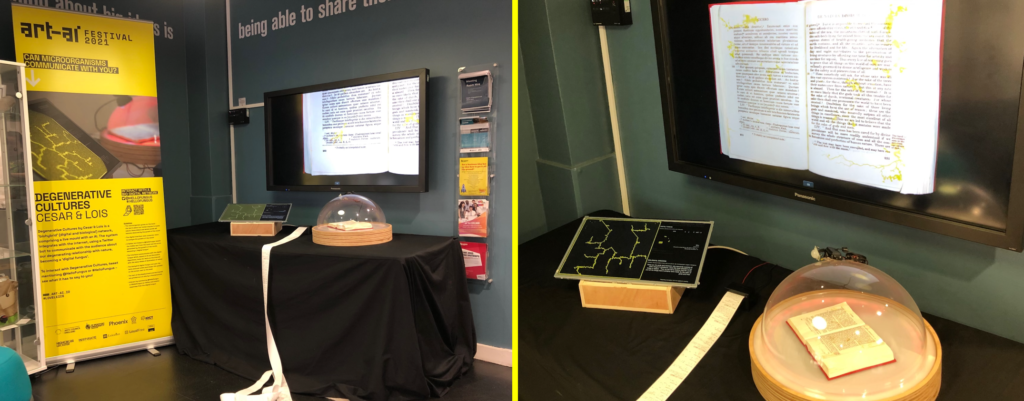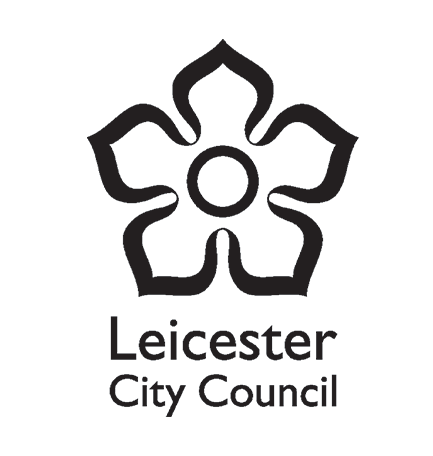About Degenerative Cultures
Degenerative Cultures is a ‘biohybrid’ (digital and biological) network, comprising a physical book which represents the documenting of our human impulse to control and reshape nature. The book serves as food for a colony of microorganism, a live slime mould called a ‘protist’.

Next to the book is a computer monitor that shows how the mould’s growth over time is being tracked and mapped using artificial intelligence. The AI and generative algorithms (based on processes of growth of living organisms) integrates with a Twitter bot, allowing anyone to interact with the system and help to destroy the texts, and in so doing, becoming a digital fungus. The intelligent digital fungus searches the internet and corrupts texts with the same predatory intent of the text found in the physical book. These two systems, one organic and the other informational, communicate with the audience through a digital screen interface.
The story of this fungal colonization of human knowledge is documented in readouts of the twitter feed of @HelloFungus, which is printed out continuously on-site on a miniature thermal printer. This ‘biohybrid’ artwork uses a compound of technologies to integrate living and digital systems in a single network, where the bio-digital fungi respond to internet users’ mentions, engaging people in an act of spreading ‘digital spores’.
This bio-digital system maps and corrupts the predatory knowledge frameworks that have consistently driven how humanity deals with nature. The resulting system makes visible those entropic patterns in human culture that have carried us into the Anthropocene.
If one considers human societies as a biological culture on Earth, our substrate is the global ecosystem. Incongruously, human societies consistently destroy this substrate, resulting in a massive cumulative loss of data in the form of species extinctions and environmental devastation.
This behavior has been conceptualized, planned and justified through ideas such as progress, beauty, domestication, profit and the superiority of human beings throughout the ages, proliferated through religion, science, art, philosophy, economy and in other contexts of society. The departure point of the project is a critical examination of these old and new texts, searching for patterns that could direct humanity to disinformation and corrupt the algorithms of Modernity.
How it works –
- The microorganism grows on the book – the text is about our human impulse to master nature. Some letters and whole worlds will become obscured by the growth of the mould.
- The digital interface is based on computer vision using a camera which analyzes the growth of the mould.
- A Twitter bot linked to @HelloFungus tweets the visible text from the book and the errors generated by the growth of the mould, becoming a ‘digital fungus’.
- The interface communicates with the digital fungus which, based on AI and Generative Algorithms, looks for texts on the Internet with the same ideals of domination of nature.
- The biohybrid digital fungus corrupts the texts sourced online and shows this process on the screen next to the book.
- The text of the physical book and the internet are printed out on-site by a thermal printer.
- People can interact by mentioning @HelloFungus or #HelloFungus on Twitter and receive responses from the digital fungus.
You can find Degenerative Cultures currently at Beta-X, 72 Church Gate, Leicester, LE1 3AN.
About Cesar & Lois
Cesar & Lois is a collective composed of Cesar Baio and Lucy HG Solomon. Cesar & Lois probe the evolution of humanity’s relationship to nature by advancing intersections between the parallel networks of technology, biological and societal systems.
Cesar & Lois consists of Brazilian media artist Cesar Baio and California-based media artist Lucy HG Solomon, often in conversation and collaboration with other artists, scientists and researchers. Formed in summer of 2017, Cesar & Lois has launched a number of projects that reorient technology and society to nature. The duo is currently working with the fungal colonization of human knowledge systems through the merging of fungal networks and Internet-based communications.
Winner of the 2018 Lumen Prize in Artificial Intelligence and 2019 selection for the Global Digital Art Prize Biennial in Singapore, Edital CoMciência in Brazil, and 2021 selection for the Aesthetica Prize shortlist, the iterative project Degenerative Cultures inserts a microbiological logic into AI and challenges the socio-technological division between humanity and nature.











